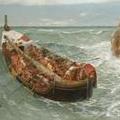Cyclops Pars Secunda
Cyclops Book One||second part
Cyclops Teil Zwei
Cyclops Part Two
Cíclope, segunda parte
Ciclope seconda parte
サイクロプス パート 2
사이클롭스 2부
Cyclopen deel twee
Cyklop, część druga
Ciclope parte dois
Cyclops del två
Tepegöz Bölüm İki
Циклоп Частина друга
独眼巨人第二部分
Ulixes in insula Cyclopum
|||of the Cyclopes
Ulysses on the island of Cyclops
Ulysse sur l'île de Cyclope
Pars Secunda
part II
Ulixes tamen meminit vinum quod ex nave portaverant.
Ulysses|However|remembers|wine|which|from|"the ship"|"they had carried"
Ulisse|tuttavia|memore|||||portavano
From a ship of Ulysses, however, makes mention of the wine which I bare the present.
D'un navire d'Ulysse, cependant, fait mention du vin que je nu la présente.
しかし、オデュッセウスは彼らが船から持ってきたワインのことを覚えています。
consilium callidum cepit.
"clever plan"|"clever"|"he/she/it took"
||ha preso
||tomou
had a clever plan.
avait un plan intelligent.
彼は賢明な決断を下した。
giganti appropinquavit et “Polypheme,” inquit, “bibe hoc vinum!
the giant|approached||Polyphemus|he said|drink|this|wine
giant approached and "Polyphemus," he said, "I drink wine?
géant approché et « Polyphème », at-il dit: « Je bois du vin?
彼は巨人に近づき、「ポリフェモス、このワインを飲みなさい!」と言った。
donum est.” Polyphemus vinum cepit et bibit.
The gift|is|Polyphemus|the wine|"took" or "seized"||
It is a gift. " Polyphemus seized wine and drinks.
Il est un cadeau. « Polyphème saisi du vin et des boissons.
それは贈り物です。」ポリュペモスはワインを手に取り、飲みました。
id valde ei placuit.
it|"very much"|"to him"|"pleased"
id|||è piaciuto
That greatly pleased.
Ce très heureux.
それは彼をとても喜ばせました。
“dic mihi nomen tuum,” Cyclops rogavit.
"tell"|to me|name|your||asked
"Tell me your name," Cyclops asked.
「あなたの名前を教えてください」とサイクロプスは尋ねました。
“Nemo,” respondit Ulixes.
"No one"|"replied"|
"No," replied Ulysses.
“Nemo,” inquit Polyphemus, “postremo te consumam.” mox gigas dormiebat.
|he said|Polyphemus said|"finally" or "last of all"||"I will devour"|"soon"|the giant slept|was sleeping
|||finally||I will consume|||
||||||em breve||
"No," said Polyphemus, "and finally to consume." Soon a giant sleeping.
「誰もいないよ」とポリュペモスは言った。「ついにあなたを飲み込んでしまうでしょう。」すぐに巨人は眠ってしまいました。
“Ninguém,” disse Polifemo, “por fim te consumirei.” Em seguida, o gigante adormeceu.
Ulixes comitesque stipitem quemdam ceperunt et in oculum gigantis propulerunt.
Ulysses|and companions|a stake|a certain|seized|||the giant's eye|giant's|drove into
Ulysses and his comrades club to capture the eye of a giant's back.
Ulysse et ses camarades club pour capturer l'œil du dos d'un géant.
ユリシーズと伯爵たちは棒を手に取り、巨人の目に突き刺しました。
Ulisses e seus companheiros capturaram um tronco e o empurraram no olho do gigante.
Polyphemus clamorem ingentem tollit.
|"loud shout"|huge|"raises"
Polyphemus takes great noise.
ポリュペモスは大きな叫び声を上げた。
Polifemo levanta um grito imenso.
ceteri Cyclopes ad speluncam Polyphemi festinant et eum rogant quid accidat.
"the other"|Cyclopes|to|the cave|of Polyphemus|hurry||him|ask|what|"is happening"
|||||apressam-se|||||acontece
, and the Cyclopes, make haste to the den of Polyphemus' s what happens to those who pray to him, and the rest.
, Et les Cyclopes, hâte de la tanière de l Polyphème ce qui arrive à ceux qui le prient, et le reste.
他のキュクロープスはポリフェモスの洞窟に急いで何が起こっているのか尋ねました。
Os outros Ciclopes apressam-se para a caverna de Polifemo e perguntam a ele o que aconteceu.
ille respondit “Nemo me vulnerat.” itaque ceteri gigantes putabant eum insanem esse et discesserunt.
"he" or "that man"||nobody|me|wounds|therefore|"the other"|giants|"they thought"|him insane to|insane or mad|to be|and|"they departed"
|||||therefore||||||||
|||||||||||||foram embora
He responded, "No pain for me." And the others are deceased, they thought it was crazy to leave.
彼は「誰も私を傷つけません」と答えた。それで他の巨人たちは彼が怒っていると思って立ち去った。
Ele respondeu que "Ninguém me fere." então os outros gigantes pensaram que ele estava louco e se afastaram.

